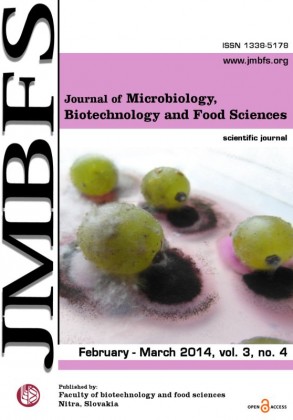PEACH POMACE PROCESSING USING TWIN SCREW EXTRUSION
Keywords:
Twin screw extrusion, peach pomace, rice flourAbstract
Fruit by-products have found limited applications in the food industry. They have been primarily used as animal feed, applied to agricultural land for soil amendment or composted and applied to farms for growing crops. Some of these disposal methods are not environment friendly, while others are costly. This study was undertaken to examine the possibility of utilizing peach pomace as a source of soluble dietary fiber in expanded extruded food products. Peach pomace was combined with rice flour at four different levels. The four blends were mixed, dried to a moisture level of 13.5% (w/w) and ground to flour. These blends were extruded in a twin-screw extruder (Clextral EV-25) at a feed flow rate of 15 kg/h. The extruded products were analyzed for physical and textural properties. The apparent and true densities for the extrudates decreased from 183.93 to 133.94 kg/m3 and 1275.31 to 1171.2 kg/m3, respectively. A linear increase in extrudate porosity (85.11-88.54%) and radial expansion ratio (13.5-19.3) and a steady decrease in breaking strength (104-50.74 kPa) were observed with increasing peach pomace level in the blends. This study demonstrates the potential of extrusion processing as a tool for fruit by-product utilization, which will not only enhance consumption of soluble dietary fiber but will also increase the overall fruit utilization.Downloads
Download data is not yet available.
Downloads
Published
2014-02-01
How to Cite
Sarkar, P., & S. Choudhury, G. (2014). PEACH POMACE PROCESSING USING TWIN SCREW EXTRUSION. Journal of Microbiology, Biotechnology and Food Sciences, 3(4), 279–285. Retrieved from https://office2.jmbfs.org/index.php/JMBFS/article/view/7013
Issue
Section
Food Sciences
License
Copyright (c) 2014 Preetam Sarkar, Gour S. Choudhury

This work is licensed under a Creative Commons Attribution 4.0 International License.
All papers published in the Journal of Microbiology, Biotechnology and Food Sciences are published under a CC-BY licence (CC-BY 4.0). Published materials can be shared (copy and redistribute the material in any medium or format) and adapted (remix, transform, and build upon the material for any purpose, even commercially) with specifying the author(s).

